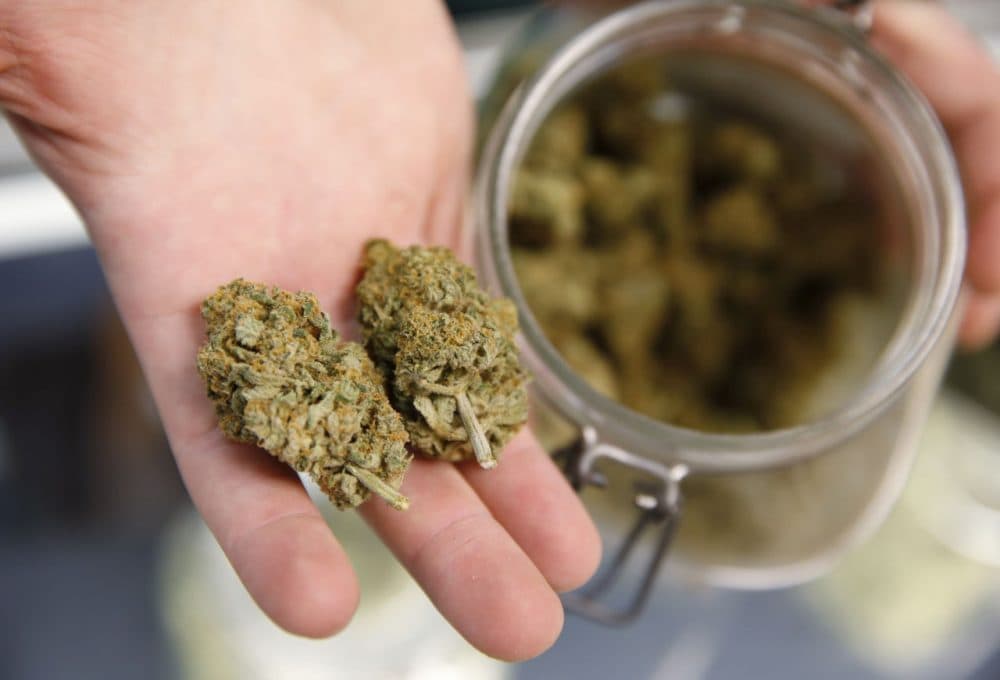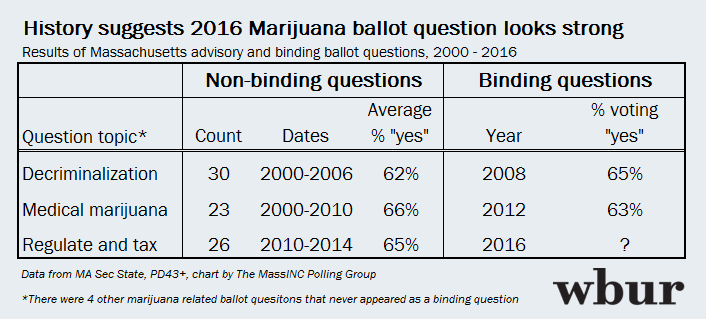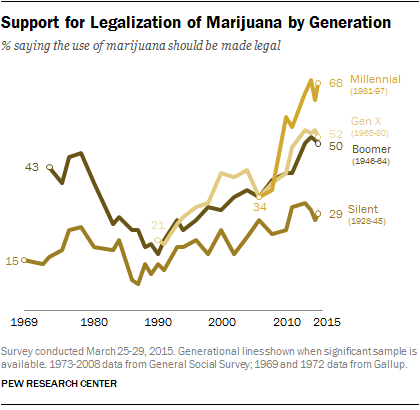Advertisement
Analysis: On Marijuana Legalization, Many Mass. Officials May Be On Wrong Side Of Public Opinion

If there’s one thing that Massachusetts public officials -- Democrat and Republican, urban and suburban, local and state -- seem to agree on lately, it’s that the voters should not legalize marijuana at the polls this November.
First, the governor, the mayor of Boston and the attorney general (or, apparently, their staffs) penned a joint op-ed in The Boston Globe poo-pooing the proposed ballot question. Then, after a fact-finding trip to Colorado, a legislative panel issued a cautionary report, all but telling voters hopeful for legalization to grow up, wise up, and get off the damn State House lawn.
What is most remarkable about this unified stand is that, by every metric available, public opinion appears to favor legalization, and by wider margins with each passing year.
You cannot accuse lawmakers of governing according to the polls and public opinion. If anything, the opposite is happening here.
Past Outcomes Suggest Strong Start For Ballot Question
In the last 16 years, there have been 85 ballot questions in Massachusetts dealing with marijuana. All 85 passed. All but two of these were non-binding public policy questions, in which voters instruct their legislators how to vote on an issue, or to introduce legislation producing the desired result. These advisory questions have no legal impact, but are often used to test the waters for potential binding ballot questions, which come later.
In each case, the advisory referenda on marijuana policy put before voters in the years leading up to the binding question did a pretty good job of forecasting the final margins, coming within 3 points of the final outcome, on average. So even before votes were cast on the actual binding ballot questions, advocates had a pretty good idea of the likely outcome, though with only two cases, we can't be sure the pattern will hold going forward.
The two binding referenda, now law, were the 2008 question decriminalizing marijuana (passed 65-35) and the 2012 question legalizing medical marijuana (passed 63-37). The 2012 question passed in every community in the state but two; the 2008 question passed in every town but four. (The one "no" vote common to both years was Lawrence, one of the most Hispanic cities in the state. National polls have found Latino voters more opposed to legalization than other voters. Lawrence voters also leave ballot questions blank at a higher rate than in other city; if anything, their opposition is likely understated by the final tally.)
Advertisement
Applying this rule of thumb to the current proposed question suggests the pro-legalization forces are in a good position.
The advisory votes in recent years that are similar to the proposed ballot question have been running, on average, 65 percent in favor of legalization and regulation -- almost exactly in line with the 2008 and 2012 ballot measures. This would suggest the percent of "yes" vote in favor of legalization would fall somewhere in the 60s, if the pattern holds.
Opinion Shifting Further In Favor Of Legalization
To date, the polling on the question has not shown quite so wide a margin, but opinion appears to be shifting further toward legalization in recent years. The most recent poll, from WBZ, shows the ballot question passing 53-40. That’s up from the last WBUR poll on the issue, in 2014, which showed legalization leading 48-41. That was again up from a WNEU poll from late 2013, when opponents (52 percent) outnumbered supporters (39 percent). If the trend continues, support may well exceed 60 percent as suggested by the advisory questions mentioned above.
This shift in Massachusetts is part of a broader national trend. Pew has been tracking the issue for decades, and finds a long-term trajectory toward legalization among most demographic groups. The improving numbers are due to more than just generational replacement, where younger voters more favorable to marijuana legalization replace older voters bit by bit. Instead, each generation is becoming steadily more favorable to the idea. Even Baby Boomers, who discovered their inner joyless scolds during their parenting years after indulging when they were young, have come around and now tilt 50-47 in favor of legalization.

Part of the trend is a change in attitudes about drugs generally and marijuana specifically. Voters are now less likely than in the past to see marijuana use as either a gateway to other drugs or a moral issue; 69 percent actually view it as less harmful than alcohol.
This shift coincides with broader changes in attitudes about criminal justice and drug policy. On a variety of issues, the public is less and less likely to view drug use as a criminal issue, favoring treatment over enforcement, even for harder drugs. On marijuana specifically, 72 percent nationally say efforts to enforce marijuana laws cost more than they are worth.
All of this adds up to more and more voters every year who are open to the idea of legalization.
And all this public opinion data makes lawmakers’ stand against legalization all the more remarkable. Of course, not all state leaders are completely opposed. Many (including the senators responsible for the committee report) cite specific policy problems with the details of the ballot question. Being lawmakers, they have an avenue to head off these problems: by building a legislative proposal that addresses these concerns.
But while they are vocal about the shortcomings of the proposal, they appear less willing to take on the challenge of crafting a policy that both reacts to apparent voter wishes, avoids the ballot question, and addresses the complexities of the issue. Instead, it looks like elected officials will make their disapproval known, and then pass both the question and the buck on to the voters in November.
Steve Koczela is president of the MassINC Polling Group and a regular contributor to WBUR Politicker. He tweets at @skoczela.